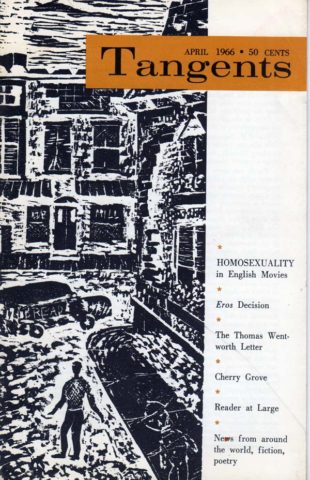 Government Should Not Have the Power to Censor Contemporary Opinion in Literature and Art
Government Should Not Have the Power to Censor Contemporary Opinion in Literature and Art
Tangents
April 1966
Vol. 1 No. 7
Editorial by Don Slater
Originally published in the April 1966 issue of Tangents
One of the obvious features of Ralph Ginzburg’s publications is that they are essentially unoriginal, badly edited attempts at getting attention for Ralph Ginzburg. To call any one of them obscene, as unwitting postal officials have his Eros magazine, his Liaison newsletter, and his Housewife’s Handbook Of Selective Promiscuity, is to give the publications a sense of greater importance than they deserve, and is to fall right into the trap of giving Ginzburg the publicity he cherishes. For our own part, we see nothing obscene in Eros or the other two publications. Their offensiveness lies primarily in the transparency of their publisher’s motives.
The U. S. Supreme Court in agreeing with the Post Office and finding Eros obscene (aside from the harshness of the criminal penalty imposed on Ginzburg himself), has emphatically justified the Post Office Department’s attempt to censor obscenity.
We don’t agree that the Post Office Department, the Customs Bureau, or any other agency of the government should have the power to censor con- temporary opinion in literature and art. The idea of censorship, accept of hard-core pornography, which is all that Justice Stewart would forbid and which is extremely slippery of definition, is patently offensive in our Democracy. Censorship by administrative inspection and regulation is a function of the Post Office Department and the Customs Bureau that should not exist. The High Court should realize that by sanctioning such governmental censorship, it permits neurotic minds to project their collective sexual fears onto all of American literature and art. In the present case, the Supreme Court’s ruling lends weight to the morally insidious and politically dangerous proposition that the average American man and woman is, and is expected to be, mentally and emotionally incapable of controlling his impulses or sorting out his own thoughts. Whenever a piece of literature or art, of whatever kind, is seized and condemned by the Post Office Department, Americans are advised in effect by their government that their minds and souls are too weak to withstand, accept, or reject such thoughts as are presented; that they require their government to save them from inner dissolution, corruption, or depravity. Removal of this attitude rather than obscene material is what is needed if we are to mature into the free society toward which we continue to claim we aspire.
As the result of the March 21 Supreme Court decision, there has been a rash of purges of “obscene” works. The Post Office Department, the Customs Bureau, state and county investigators are engaged in the wholesale censoring and suppressing of American and foreign nudist magazines, nude photography magazines, girlie and burlesque magazines, crime and detective magazines, and “magazines for homosexuals.” The only trouble with most of these periodicals appears to be that they touch upon the subject of sex. Whether the material is pornography or Attic comedy is a question never asked. The censor is determined to save the reader’s mind from immoral thoughts. We ask only how it can be a proper function of a democratic government to intrude upon individual morality and compel the individual to be saved from himself? The answer is, of course, that nothing could be more ill-conceived or futile. Nothing could be more repugnant to the ends of freedom of thought and freedom of expression.
![]()
©1966, 2016 by The Tangent Group. All rights reserved.

